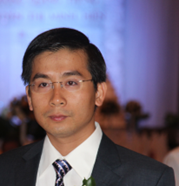Keynotes
Hybrid Classical–Quantum Computing-Inspired Optimization for 6G Wireless Networks
Dr. Trung Q. Duong (IEEE Fellow, IET Fellow, CAE Fellow, EIC Fellow, and AAIA Fellow) is a Canada Excellence Research Chair and Full Professor at Memorial University of Newfoundland, Canada. He is also an adjunct professor at Queen’s University Belfast, UK and a visiting professor under eminent scholar program at Kyung Hee University, South Korea. His current research interests include quantum optimisation and machine learning in wireless communications. He is an author/co-author of 650+ publications with 24,000+ citations and h-index 84. He has served as an Editor for many reputable IEEE journals (IEEE Trans on Wireless Communications, IEEE Trans on Communications, IEEE Trans on Vehicular Technology, IEEE Communications Surveys & Tutorials, IEEE Communications Letters, and IEEE Wireless Communications Letters) and has been awarded best paper awards in many flagship conferences including IEEE ICC 2014, IEEE GLOBECOM 2016, 2019, and 2022. He was the only UK-based researcher awarded both the Research Fellowship and Research Chair from the Royal Academy of Engineering. In 2017, he was awarded the Newton Prize from the UK government. He is currently the Editor-in-Chief of IEEE Communications Surveys & Tutorials and an IEEE ComSoc Distinguished Lecturer. He is a fellow of the Institute of Electrical and Electronics Engineers (IEEE), the Institution of Engineering and Technology (IET), the Canadian Academy of Engineering (CAE), the Engineering Institute of Canada (EIC), and the Asia-Pacific Artificial Intelligence Association (AAIA). He is the Founding Director of Quantum Communications and Computing Center (QC3).
Abstract
Quantum computing uses the concept of quantum mechanics to offer a massive leap forward in relations to solving complex computation problems. Hybrid quantum-classical machine learning algorithms can significantly enhance the processing efficiency and exponentially computational speed-up, highly capable of guaranteeing high QoS requirements of 6G networks. This talk presents the state-of-the-art in quantum machine learning and optimization and provide a comprehensive overview of its potential, via machine learning approaches. Furthermore, this talk introduces quantum-inspired machine learning/optimization applications for 6G networks in terms of 6G channel estimation and RF fingerprinting considering their enabling technologies and potential challenges. Finally, some dominating research issues and future research directions for the quantum-inspired machine learning/optimization in 6G networks are elaborated.

Trung Q. Duong
IEEE Fellow, IET Fellow, EIC Fellow, CAE Fellow, AAIA Fellow
Responsible AI-Enabled Solutions for Sustainable and Climate-Smart Agriculture
Professor Po Yang (PY) is Professor of Pervasive Intelligence in the School of Computer Science (COM) at the University of Sheffield (UoS), and also the Deputy Director of Research and Innovation in COM. He obtained his BSc (Hons) in Computer Science from Wuhan University in China, MSc in Computer Science from the University of Bristol, and PhD in Electronic Engineering from Staffordshire University. Since 2015, he has built a research team at Liverpool John Moores University (2015 – 2019) and then Sheffield (2019 – now).
Po has extensive research experience in pervasive and mobile intelligence, where he conducted interdisciplinary research across machine learning, pervasive computing, smart sensing, and data science. Since 2019, he has been the Principal Investigator on £1.1 million of research funding, and the Project Coordinator on over £2.6 million of research funding from InnovateUK, BBSRC, STFC, EPSRC, Research Englangd, industrial funds, etc.
He has published 100+ journal papers and 80+ IEEE/ACM conference papers, with over 5000 citations (h-index 39). This includes 43 IEEE Trans/Journal, 10 top conferences (AAAI, KDD, and CIKM), 4 ESI Highly Cited Paper, and the 2022-Best Paper of IEEE IES Society TC-II. He serves as an Associate Editor in IEEE Journal of Translational Engineering in Health and Medicine, Journal of Biomedical Informatics and Scientific Reports.
Abstract
Crop pests and pathogens pose a major challenge to sustainable agriculture, reducing yields and threatening global food security. In this talk, Professor Po Yang will present recent advances in responsible AI-driven tools for pest detection, quantification, and management. The work introduces novel AI model architectures that produce structured audit trails by revealing morphological features, enabling zero-shot detection of nematodes and other crop pests in complex environments. These models can generate detailed, interpretable morphological descriptions and integrate them into transparent decision-making processes. In parallel, farmer-centred AI decision-support systems translate model outputs into context-aware recommendations for pest thresholds and management strategies. Together, these approaches exemplify how responsible AI can bridge advanced analytics with practical agricultural solutions, enabling precise, scalable, and sustainable pest management that supports both productivity and environmental stewardship.

Po Yang
IEEE Fellow, IET Fellow, EIC Fellow, CAE Fellow, AAIA Fellow

Nicos Maglaveras
Professor of Medical Informatics Aristotle University of Thessaloniki Greece
Personalised health driven by digital health systems and multi-source health/environmental data, ML/AI/DL analytics and predictive models
Nicos Maglaveras received the diploma in electrical engineering from the Aristotle University of Thessaloniki (A.U.Th.), Greece, in 1982, and the M.Sc. and Ph.D. degrees in electrical engineering with an emphasis in biomedical engineering from Northwestern University, Evanston, IL, in 1985 and 1988, respectively. He is currently a Professor of Medical Informatics, A.U.Th. He served as head of the graduate program in medical informatics at A.U.Th, as Visiting Professor at Northwestern University Dept of EECS (2016-2019), and is a collaborating researcher with the Center of Research and Technology Hellas, and the National Hellenic Research Foundation.
His current research interests include biomedical engineering, biomedical informatics, ehealth, AAL, personalised health, biosignal analysis, medical imaging, and neurosciences. He has published more than 500 papers in peer-reviewed international journals, books and conference proceedings out of which over 160 as full peer review papers in indexed international journals. He has developed graduate and undergraduate courses in the areas of (bio)medical informatics, biomedical signal processing, personal health systems, physiology and biological systems simulation.
He has served as a Reviewer in CEC AIM, ICT and DGRT D-HEALTH technical reviews and as reviewer, associate editor and editorial board member in more than 20 international journals, and participated as Coordinator or Core Partner in over 45 national and EU and US funded competitive research projects attracting more than 16 MEUROs in funding. He has served as president of the EAMBES in 2008-2010. Dr. Maglaveras has been a member of the IEEE, AMIA, the Greek Technical Chamber, the New York Academy of Sciences, the CEN/TC251, Eta Kappa Nu and an EAMBES Fellow.
Abstract
The last years saw a steep increase in the number of wearable sensors and systems, mhealth and uhealth apps both in the clinical settings and in everyday life. Further large amounts of data both in the clinical settings (imaging, biochemical, medication, electronic health records, -omics), in the community (behavioral, social media, mental state, genetic tests, wearable driven bio-parameters and biosignals) as well as environmental stressors and data (air quality, water pollution etc.) have been produced, and made available to the scientific and medical community, powering the new AI/DL/ML based analytics for the identification of new digital biomarkers leading to new diagnostic pathways, updated clinical and treatment guidelines, and a better and more intuitive interaction medium between the citizen and the health care system.
Thus, the concept of connected and translational health has started evolving steadily, connecting pervasive health systems, using new predictive models, new approaches in biological systems modeling and simulation, as well as fusing data and information from different pipelines for more efficient diagnosis and disease management.
In this talk, we will present the current state-of-the-art in personalized health care by presenting cases from COVID-19 and COPD patients using advanced wearable vests and new technology sensors including lung sound and EIT, new outcome prediction models in COVID-19 ICU patients fusing X-Rays, lung sounds, and ICU parameters transformed via AI/ML/DL pipelines, new approaches fusing environmental stressors with -omics analytics for chronic disease management, and finally new ML/AI-driven methodologies for predicting mental health diseases including suicidality, anxiety, and depression.


